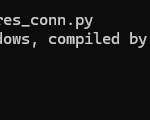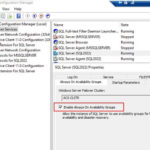
What is Delayed Durability in SQL Server — And Should You Turn It On?
Introduction When SQL Server commits a transaction, it doesn’t just update data in memory. It also writes a record to the transaction log on disk. Only after this log is flushed does SQL Server confirm the commit to the client. This extra step ensures …
DevOps vs. SRE: Bridging the Gap, Not Building Walls
The post DevOps vs. SRE: Bridging the Gap, Not Building Walls appeared first on SQLServerCentral.
[Video] Office Hours in Icy Strait Point, Alaska
For the last couple of months, I’ve been trying to get my on-location Office Hours episodes filmed with an Insta360 so you can pan the camera around to see the sights. Folks, I’ve finally pulled it off! You can move the camera around with your clicker: …

Why Aren’t People Going to Local and Regional In-Person Events Anymore?
Steve Jones recently posted an update about SQL Saturday’s status, and it includes some news we need to talk about: However, this year the number may stagnate or even decline slightly. Running events has become challenging for many communities. Organiz …
PostgreSQL High Availability Options
The post PostgreSQL High Availability Options appeared first on SQLServerCentral.

SQL Server 2025 RC0 Is Out with New Preview Features Settings
The release of SQL Server 2025 keeps inching closer. Release Candidate 0 is out now, and here are the release notes. If you’re planning on replacing your SQL Server 2016 instances (which go out of support next July) with 2025, now would be a good time …

Unlocking the Power of FULL OUTER JOIN in SQL: Performance, Use Cases & Examples
The JOIN statement is one of the most common operations SQL developers perform. Yet in a world ruled by Inner and Left Joins, the poor Full Outer Join is like Cinderella before the ball – allowed out on only the rarest of occasions. In an (unscientific …

Using psycopg2 to Connect Python to PostgreSQL
Overview The psycopg2 library makes working with PostgreSQL databases in Python much easier. This has been the most popular PostgreSQL adapter for Python. Whether you’re building backend services, data pipelines, or automation scripts, psycopg2 is your …
Long Short-Term Memory Network for Machine Learning
The post Long Short-Term Memory Network for Machine Learning appeared first on SQLServerCentral.

From Rows to Pages: The Hidden Chaos Behind SQL Server’s Sampling Methods
Introduction Sampling data is a common requirement in many real-world SQL Server workloads. Whether you are trying to test a subset of data, preview records before an export, or build a small development copy of a table, sampling becomes a go-to tool. …

SQLBits 2026 is Going Back to Newport, Wales.
SQLBits 2026 will be back at the International Convention Center Wales in Newport on April 22-25, and I’ll be there! Bits was there in 2023, and they’ve got a recap video showing the venue. This location is a little tricky for us Yanks: here’s where it …

Contained Availability Groups in SQL Server 2022
SQL Server 2022 introduced a new feature called Contained Availability Groups. It allows the Database Administrators to effectively manage the Server Level objects, such as Logins, SQL Agent jobs, etc. in an HA environment. In today’s article, we will …

Save $150 on the Summit with Discount Code BRENT25
The PASS Data Community Summit is the biggest conference in the Microsoft database industry, and over the last few years, they’ve expanded to cover other databases as well. It’s in Seattle on November 17-21 this year. It costs $2195 for the Weds-Fri ge …
MySQL Shell Basic Configuration Management (Part 6 – Backups and Recovery Procedures)
In this final part of the MySQL Shell Configuration Management series, we explore how to automate performance tuning, backups and recovery using MySQL Shell. This guide introduces a complete system that captures not just data, but also configuration an …
Split strings by Regular Expressions in SQL Server 2025
The post Split strings by Regular Expressions in SQL Server 2025 appeared first on SQLServerCentral.

